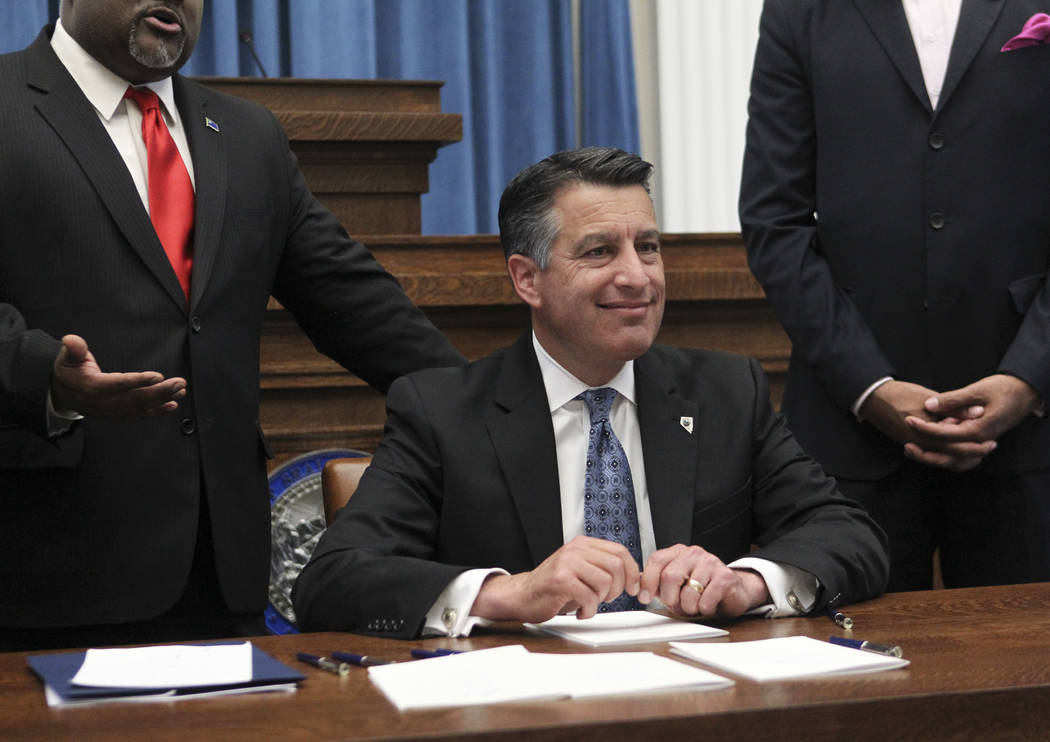Nevada Gov. Brian Sandoval jealous guard of executive power in vetoes
Gov. Brian Sandoval has turned out to be a jealous guard of executive authority, as a pair of vetoes from the 2017 session show.
First, the governor vetoed Assembly Bill 403, an audacious attempt by legislators to exert more control over state government than ever before.
The bill would have given the Legislative Commission — a group of Assembly and Senate members who meet when the Legislature is out of session — the ability to suspend or nullify regulations written by state agencies to implement laws. And the courts couldn’t overrule the panel.
The intent was to allow lawmakers to reject regulations that don’t comport with the intent of bills, but the effect could have been much grander. Let the governor explain.
“AB 403 is a legislative overreach that attempts to upset the established balance between Nevada’s three branches of government when it comes to the approval, enforcement and review of regulations adopted by executive branch agencies,” Sandoval wrote in his veto message. “Thus if AB 403 becomes law, the Legislature, through the Legislative Commission, would be transformed into a standing body with unchecked powers and jurisdiction that exceed constitutional limits. “
And if there’s to be a standing body with unchecked powers and jurisdiction, let that be the governor, the way God and the framers of the Nevada Constitution intended!
Nevada has a relatively weak Legislature: It meets but once every two years, and for only 120 days, passing laws that are then written into regulations by state bureaucrats and interpreted by state courts, sometimes in ways lawmakers find objectionable. AB 403 was an attempt to gain more legislative influence.
But the governor was having none of it: “In short, AB 430 simply concentrates too much power in the legislative branch of government,” he wrote. And in the zero-sum separation of powers game, concentrating authority with the Legislature necessarily takes it away from the executive or the judicial. And, to hell with that! (the governor didn’t add).
Separated powers also grounded the reasoning behind Sandoval’s veto of Assembly Bill 303, which would have essentially banned private prisons in Nevada (or the use of private prisons outside the state under contract). The bill would have required “core correctional services” to be provided only by the state or a local government.
“But because the bill improperly encroaches on the authority and the discretion of the executive branch of state government, including the state Board of Prison Commissioners, I cannot support it,” Sandoval said.
Under the constitution, it’s the executive branch that runs prisons, and makes decisions about where to house inmates, inmate needs or segregation issues (e.g. housing rival gang members in separate institutions to avoid conflict).
“Where AB 303 goes too far, however, is by limiting the discretion of the director of the Department of Corrections by prohibiting the use of private prisons, starting in 2022,” Sandoval wrote. Citing a burgeoning prison population and the potential cost of building new prisons, “the best solution to mitigate overcrowding was to contract with out-of-state private prisons to take some of Nevada’s inmates,” he concluded.
In other words, said the governor, the Legislature cannot go so far as to tell the director exactly how he may, or may not, go about doing his job, thank you very much. (Notably, AB 303 was introduced by Assemblywoman Danielle Monroe-Moreno, D-North Las Vegas, a former corrections officer.)
The moral of the vetoes? Each branch of government has its own portfolio, carefully aligned but not necessarily in equal balance. And when one of those branches appears to upset that balance, another will step in to just say no.
Contact Steve Sebelius at SSebelius@reviewjournal.com or 702-387-5276. Follow @SteveSebelius on Twitter.




























